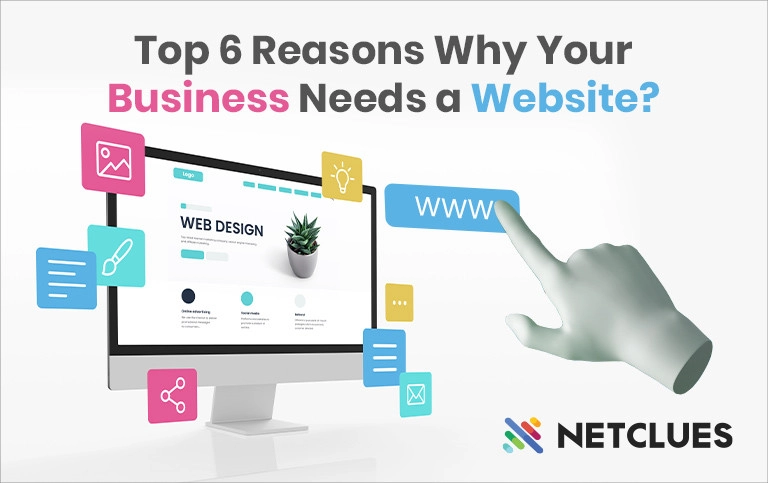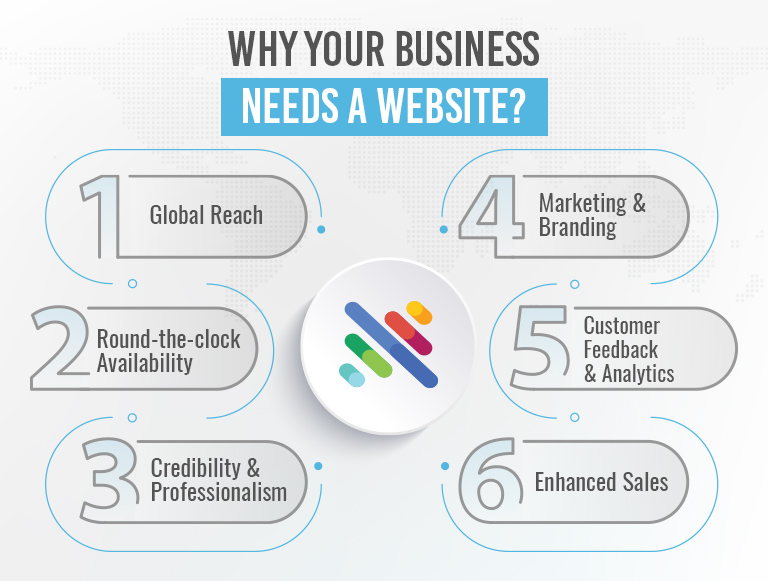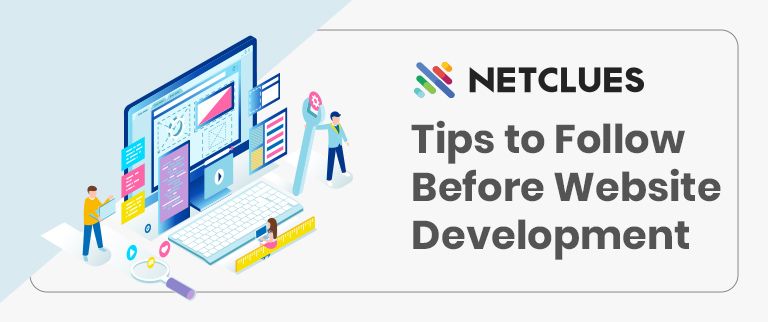
It’s 2024, and thanks to technology, most of you already know that whether you are a small business owner selling handcrafted art pieces or a giant tycoon offering top-notch IT services, having a website is no longer an option—rather a necessity.
While the hype of website development continues to echo among different sectors, many industry players still haven’t tapped into its immense potential to revolutionize their business.
According to a statistic by Top Design Firms, 28% of small businesses have no website.
You might be wondering, despite the awareness, why enterprises are not leveraging the power of this medium. Some are hesitant to take the leap of faith, while others remain uncertain about its world of advantages, including increased sales and customer acquisition.
If you are sailing in the same boat, it’s time you chart the course to the other side of the river. Meaning that you should build a site and explore the opportunities calling your name.
6 Reasons Why Your Business Needs a Website or Why businesses should build a website

1. Global Reach
Every business aims to spread its wings to a broader and better range of audiences to achieve remarkable success. However, it is simpler to say from afar. To establish your venture across the world, it's crucial to be patient, persistent, and, most importantly, implement the right strategies — one of them is leveraging professional web development services.
According to a recent study by Demandsage, the internet has 1.5 billion websites worldwide. Esopnow says businesses with sites grow a substantial percentage of 15-50 compared to ventures that did not set foot in the digital sphere.
The above numbers clearly suggest that a well-developed and SEO-friendly website can take your business to the next level. You cannot only lay the foundation of your online presence but also extend your services or products to demographics without any geographical boundaries as one would witness offline.
The ability to reach global audiences is further enhanced by the rise of e-commerce platforms and social media advertising, which can target specific demographics and interests across borders.
2. Round-the-clock Availability
In the wise words of Michael LeBoeuf, “A satisfied customer is the best business strategy of all.” And we couldn’t agree more.
Your customers are the king, and keeping them happy is the best way to elevate your company to impressive heights. There are numerous ways to forge a path in the hearts of your target audience, including affordable pricing and realizing their pain points.
Although 24/7 accessibility remains a differentiator that is expected and appreciated by your customers. Unlike the brick-and-mortar store, which is bound by operational hours, the digital shop serves as a gateway for the audience to approach your business from any time and any corner of the world.
Implementing a live chat feature can also enhance this availability, allowing customers to get real-time assistance and fostering a sense of engagement and support.
This also significantly increases your sales. Your target base doesn’t have to wait until the next day to buy a desired product or unlock a service. They simply have to visit your website and get anything at their fingertips.
Beyond uninterrupted access, prompt customer support is another factor to keep them satisfied. Oracle claims that 42% of customers anticipate a response within an hour, and 32% hope to get a reply in 30 minutes.
Truth be told, providing round-the-clock convenience can be a challenge, especially if you have a smaller team.
This is when a website takes center stage.
Integrating tools such as a WhatsApp chatbot or setting up automated email is a great way to showcase that your customer query has been addressed. It is advised to mention the estimated time to resolve the issue in the first conversation or email to demonstrate your commitment.
3. Credibility & Professionalism
Today, 2.14 billion shoppers prefer digital mediums to buy essentials, says Tidio. From booking entertainment shows to paying utility bills to stocking up weekly groceries, online shops remain a go-to model for countless consumers.
As customers actively engage with virtual platforms for shopping, they also seek a reliable and smooth experience. Developing a web store from a professional company can help you exactly do that.
To build a strong foothold in the virtual landscape, taking security measures into account is a must. Incorporate SSL encryption and integrate safe payment methods. This protects users’ sensitive information & authenticates your enterprise, which is a prime factor in the era where internet penetration is at its peak.
Additionally, having a professional-looking website can significantly enhance your credibility. A well-designed website instills trust and encourages potential customers to explore your products or services.
While security reinforces the message of trustworthiness, structured & updated information, appealing & intuitive layout, and captivating visuals display professionalism which increases user engagement.
A website is more than the technicalities. It is a fantastic channel for showcasing your core values, dedication, commitment to excellence, and expertise. By featuring testimonials, your offerings, and the incredible journey in forming your business, you can reflect your identity and forge an emotional connection with users.
4. Marketing & Branding
Earlier business owners relied on word-of-mouth marketing, pamphlets, brochures, and newspapers, but now times have changed drastically. Today, social media, paid advertisements, and websites are the central hubs to promote your brand.
Among all three, the website is a cornerstone of your digital marketing strategy. Apart from boasting your services, create SEO-optimized write-ups & compelling visuals directly or indirectly related to your business. This will generate leads and boost sales organically followed by creating awareness of who you are and what is your vision, overall turning a business into a brand.
Utilizing email marketing campaigns alongside your website can also enhance customer engagement and retention. By regularly sharing valuable content, offers, and updates, you can keep your audience informed and connected to your brand.
Conduct paid marketing campaigns for quick yet meaningful impressions and conversions. Your social proofs, such as Instagram, Facebook, LinkedIn, Twitter, and more, can also be included on your website.
Curious visitors can check out your accounts, increasing the likelihood of followership, likes, shares, and comments.
Fascinating, right? How one stone can kill two birds.
5. Customer Feedback & Analytics
You might think you are well aware of your customer’s needs. But dear reader, many nuances go unnoticed when you don’t have comprehensive insights that can considerably enhance a user’s journey with your business. One way to discover this untapped potential is analytics.
Analytics are your childhood friend who always stays by your side. Meaning, they guide in strategic decision-making and improve business performance.
From customer behavior to preference to interactions, metrics are an enlightening path that cannot only help you learn the key areas of improvement but also understand whether you are on the right track.
Incorporating customer feedback mechanisms on your website, such as ratings or reviews for products and services, can provide valuable insights while also making your customers feel valued and heard.
There are various web analytics tools, including SEMrush, Google Analytics, Hotjar, Ahrefs, Moz, and Google Search Console that allow you to sneak peek into the customer’s journey and revamp your strategies to elevate their experience.
Communication is the key to success and the same applies to collecting user feedback. People say a lot has changed over time, but we say otherwise when it comes to gathering feedback.
In the past, reviews were often obtained by conducting surveys and filling out feedback forms from customers in person or over a call. Nowadays, we still follow the same methods with a digital twist.
Through a website, you can easily integrate feedback forms or add a survey section for users to share their thoughts and suggestions.
This gives you a vivid picture of what and where you need to improve. Upon working on those pointers, you maximize customer satisfaction and ultimately embrace prosperity in your sector.
6. Enhanced Sales
ROI, or Return On Investment, is the primary goal of any business. If you cannot make fruitful profits or even cover your initial capital, your venture won’t survive in today’s competitive space. Fortunately, websites are a solid approach that guarantees promising growth if utilized effectively.
Keen on learning what harnessing its power efficiently means in this context?
Your website must pass two checks —
Your website should also include compelling calls-to-action (CTAs) that guide visitors towards desired actions, such as signing up for newsletters, requesting quotes, or making purchases.
» Audience: An effortless experience cannot be overstated. Throughout the years, consumer needs have only increased. A user-friendly layout won’t just work wonders for you.
Be it a vibrant color scheme or quality content, clickbait calls-to-action, or the logical hierarchy of your site, everything has to be up to the mark and tailored to unique preferences for engaging and converting them into a loyal community.
» Search Engines: Once you crack the code to what users want, the next paramount step is to make your website SEO-friendly.
You have to focus on -
» On-Page SEO: All the SEO activities conducted on your website are referred to as On-Page SEO. This includes drafting quirky and up-to-date write-ups, adding relevant keywords to the content, descriptions, meta tags & titles, maintaining a structured layout, and creating concise and straightforward URLs.
Utilizing A/B testing can help you determine which elements of your site are most effective in driving conversions, allowing you to continuously improve user experience.
» Off-Page SEO: Off-Page SEO is a digital marketing strategy that prioritizes building authority and credibility beyond your website.
Here, you generate backlinks from reputable sites to empower your website. Third-party blogging, building a powerful social media presence, social bookmarking, and influencer marketing are the best Off-Page SEO practices.
» Technical SEO: Technical SEO plays a pivotal role in amplifying the technicalities of your website with the goal of making it crawlable and indexable by search engine bots.
This type of SEO encompasses optimizing visuals, reducing HTTP requests, and utilizing browser caching & CDN to improve the turnaround time of your website.
It is also aimed at mobile friendliness, adding schema markup, removing unnecessary and duplicate content, and setting up proper redirects to enhance performance and user experience.
Considering these prerequisites can fulfill the needs of your demographics and, at the same time, ensure you achieve a desired goal, which is earning lucrative returns on your investment.
It is recommended to employ a digital marketing service provider to make the most of your marketing efforts. Hiring an experienced resource or team is a thoughtful move that can help you sustain and thrive among the competition.
Tips to Follow Before Website Development

So far we highlighted 6 reasons why website development is imperative for your business. Below are some tips to know for cutting-edge web design and coding.
- Tip 1: Define your objective for website development. Is it for blogging, selling products, providing services, or something else?
- Tip 2: Research the market & competitors and create a detailed customer profile, including their preferences, age, salary range, gender, behavior, and more.
- Tip 3: Opt for a domain name that is easy to spell and write. Avoid jargon words, numbers, and special characters.
- Tip 4: Get a reliable and reputed hosting provider that offers 99% uptime, constant customer support, plenty of storage space, and robust security features.
- Tip 5: Map out a content strategy and topics you plan to write on. Outline how you will organize it and who will look over & maintain it.
- Tip 6: Choose a type of platform or website fitting to your budget, goal, and target audience. You can either go for CMS or get professional web development services for building a platform from scratch.
- Tip 7: Ensure your website is user-friendly, SEO-optimized, and responsive on all screen sizes.
- Tip 8: Test the website thoroughly before launching to make sure there are no bugs and it is compatible with browsers & functional on every device.
- Tip 9: Make sure to take frequent backups and updates for maintaining your website and safeguarding it from cyber-attacks such as hacking, phishing, malware, identity theft, data breaches, etc.
Conclusion
We hope this write-up has captured your interest and is informative, shedding light on the importance of a website for a business. Always remember that a site is not a mere tool to gain exposure but rather an asset that facilitates customer acquisition, credibility & professionalism, marketing your invaluable idea, driving sales, and elevating the customer experience like never before!
Looking to build a next-generation website to scale your business to the next level? Contact Netclues today! We are a reliable and experienced website design and development company offering a pool of top-notch resources suiting your project needs.



